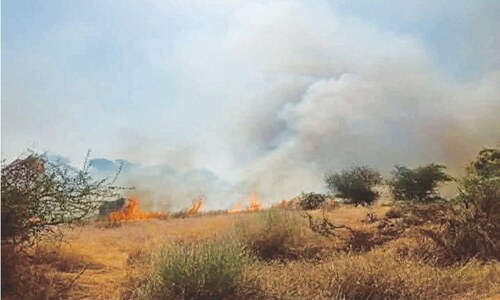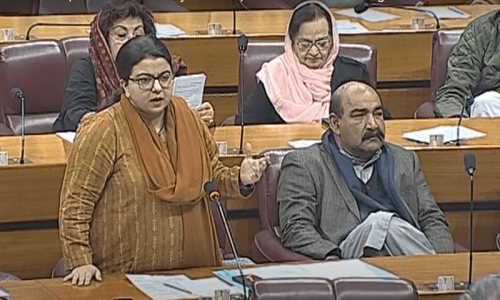HYDERABAD, Nov 1: It is quite rare for the Sindh government to announce start of sugarcane crushing in November and that too, with the difference of only Re1 in comparison to Punjab - normally ranging between Rs3-4. The move perhaps is taken to avoid a conflict wherein crushing, which begins in October. Millers always defy it on one pretext or the other.
The 48-year old history indicates that never ever was the crushing season announced other than in October, said Sindh Abadgar Board (SAB) President Abdul Majeed Nizamani. He attributed less cane production and delay in crushing to holding back of growers’ payment of quality premium since 1998-99.
Skyrocketing electricity tariff, high cost of input and water shortage have forced growers to switch over to paddy crops as the time of water availability coincided with its need for paddy crop. These factors would ultimately effect sugarcane production to drop by some 30 to 40 per cent.
However, the Sindh Agriculture Department itself brought the issue on record that the cane production was less by 14.1 per cent because of sugar mills crisis and low rates paid to growers for last year’s crop due to which they switched over to wheat, sunflower, and other Rabi crops. According to department’s figures the area under cane production in 2008 is 6,55,182.51 acres in comparison to 7,60,390.507 acres in 2007.
It is Sindh government’s practice to announce date of crushing from October 1 and keep cane rate higher by Rs3-4 than Punjab. But this year around it is with a difference of Re1 only with Rs81 for 40kg because of more sugar recovery from Sindh cane along with higher cost of input while Punjab also does not face water shortage, either.
The outstanding dues of growers to the tune of Rs212 billion of 2007 are yet to be decided.
Last season, the Sindh government announced rates twice, first Rs67 for 40kg which remained in force till January 21, 2007 and then after buckling to the pressure of mills management, the rate dropped to Rs63 keeping growers busy in two different calculations.
SAB General Secretary Mehmood Nawaz flayed mills for slashing official rate to Rs60 and Rs57 per 40kg.
He revealed that last season growers received even Rs45 per maund and all these overbearing tactics forced them to give up cane cultivation.
Sindh growers link crushing controversy and likely low production to payment of dues of quality premium - estimated by SAB President to be around Rs9,610 million. He said that around 5,00,000 growers are deprived of dues since 1998 to date which remains a bone of contention between millers and growers while former even challenged the Sindh High Court judgement in favour of the latter. The row cropped up when sugar recovery crossed the benchmark of 8.7 per cent per 100kg and millers held back the premium payment. The benchmark for Punjab and the NWFP is 8.5 per cent.
According to All Pakistan Sugar Mills Association, sugar recovery remained at 9.9 per cent in 1997-98 against the benchmark of 8.7 per cent which ensures growers the quality premium fixed at 0.32 paisa per maund, recalled Nizamani adding that some 13,74,477 tons cane was crushed that year.
In 1998-99, the government fixed the quality premium at 0.50 paisa with crushing touching 13,5,3012 tons and recovery at 8.96 per cent – lowest ever. The cost of premium was calculated at Rs270 million on which millers went into litigation and held back the payment.
Nizamani claims of calculating withheld payment of quality premium at Rs9,610 million in the last one decade with average sugar recovery from cane at 9.310 per cent, indicating a difference of .619 per cent.
He further hints at switching over of crops by growers as cane is high delta crop involving high cost of inputs and water shortage.
Growers now prefer per acre high yield cane verities over sugar recovery as before 1997, they were interested in premium payment and never provided cane to mills without indent.
The resolution of quality premium issue will encourage growers to go for better cane variety and yield and coincide harvesting with crushing date. However, conflict of rate and crushing season is now a routine, remarked Nizamani.














































Dear visitor, the comments section is undergoing an overhaul and will return soon.